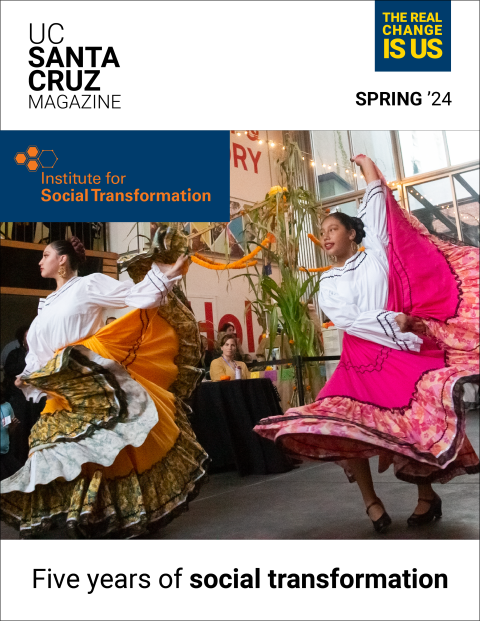Advancing campus-wide efforts to achieve educational equity, UC Santa Cruz has earned a $3 million grant that will support Latinx community college students in transferring to campus and, while they’re here, contributing to research projects and preparing for graduate school.
The Department of Education Hispanic Serving Institution grant will provide five years of funding to Cultivamos Excelencia.
Charis Herzon, Hispanic Serving Institution Initiatives Director, is the Principal Investigator and Saskias Casanova, Assistant Professor of Psychology, is co-principal investigator on the grant, which will build a transfer-receptive culture for Latinx and low-income community college students to thrive in their transfer pathways to UC Santa Cruz, and beyond, opening opportunities to graduate studies.
"It is exciting to see how this research collaboration with the Services for Transfer and Re-Entry Students (STARS), which focused on understanding the lived experiences and strengths that transfer students of color bring to our campus, contributed to receiving the Cultivamos Excelencia HSI grant,” Casanova said. “With the grant support, I am eager to continue this work with our students, faculty, and staff colleagues as we develop and assess programming that intentionally centers the voices and needs of our transfer students of color and enhances transfer receptivity at UCSC.”
UC Santa Cruz, a national leader as a Hispanic-Serving Research Institution, seeks to create systemic change that will improve and streamline these pathways and the lives of local community college Latinx, first-generation and low-income students and address issues of inequities of transfer, graduation, and advancing to graduate studies rates.
UC Santa Cruz has a long Latinx-serving history through student organizations, research, and academics. Earlier this year, UC Santa Cruz earned the Seal of Excelencia for intentional campus-wide efforts to serve Latinx students.
The Research Center for the Americas, established in 1992 and renamed in honor of Dolores Huerta earlier this month, is the first research center in the UC system to combine perspectives from the traditionally disconnected fields of Latinx ethnic studies and Latin American area studies.
In 2012, UC Santa Cruz faculty launched the nation’s first Latin American and Latino Studies Ph.D. program, which offers an innovative transnational and interdisciplinary approach to the study of the peoples, cultures, societies and institutions of the Américas.
That same year, Latinx students made up more than 25 percent of UCSC’s undergraduate enrollment, making it the third UC to become a Hispanic Serving Institution (HSI) according to the U.S. Department of Education definition. Three years later, UC Santa Cruz was awarded two Department of Education Title V grants to help the campus increase achievement for Latinos and all students, as well as partner with San Jose City College to help transfer students earn their bachelor's degrees at a research university. The HSI Team has earned five multimillion dollar grants to advance educational equity, cultural inclusivity, and academic achievement.
The Cultivamos Excelencia grant project aims to build and strengthen relationships with local community college colleagues and students; deepen understanding of transfer pathways at the departmental level and streamline the transfer process; and expand pathways for our transfers to participate in research and work toward graduate school, receive mentorship and foster connections with faculty.
"What I value most about participating in this project is being able to foster a space of care and community where students can share their lived experiences at the university and how these experiences have impacted their academic careers,” Cultivamos Excelencia program coordinator Francia Cruz Silva said. “I am excited to develop and implement the Community College Partnership Program, which will develop meaningful relationships with our community college partners to better support and bridge the gap between the community college and the university"
Community college is the most common starting institution for Latinx students beginning their higher education journey. Transfer pathways also offer students a chance to re-engage with higher education if they left due to personal, family, or career needs, which were amplified by the Covid-19 pandemic.
“Across higher education institutions, we see significant inequities in transfer rates among community college students of color into universities,” said Sara Radoff, STARS director. “The Cultivamos Excelencia HSI grant will enable us to innovate services and practices at UC Santa Cruz to intentionally serve transfer students of color. I'm most excited to continue partnering with students to understand their needs and activate learning into institutional change projects with my faculty and staff colleagues."
By enacting the interventions mentioned above, the Cultivamos Excelencia grant project will increase the number of newly enrolled Latinx transfer students by 10 percent; increase the number of degrees awarded to Latinx transfer students by five percent; further develop Latinx transfer students’ sense of belonging; encourage Latinx transfer students’ intention to attend graduate school; and expand the capacity at UC Santa Cruz to serve our transfer students of color.
"It's not very often that researchers get the chance to put into practice research that can support transfer students of color, so I'm very excited to continue to engage in this process,” said Valeria Alonso Blanco, a psychology doctoral student researcher. “I also know many graduate students look forward to mentoring transferring students and supporting them in their path toward graduate school."
To advance efforts to increase opportunities for those historically underserved by higher education, UC Santa Cruz earlier this year joined other leading universities to form the Alliance of Hispanic Serving Research Universities. A coalition of 21 research universities, the alliance is working to double the number of Latinx doctoral students enrolled at member universities and increase by 20% the Latinx professoriate in member universities.
UC Santa Cruz holds the distinction of being only one of four institutions in the Association of American Universities that is both an HSI and an Asian American and Native American Pacific Islander-Serving Institution. The campus is continuing to advance and strengthen its work as a Hispanic-Serving Institution and is working to develop equity-minded partnerships that span across the region, state, and nation and through the academic pipeline.



